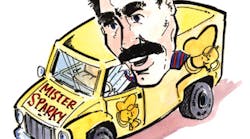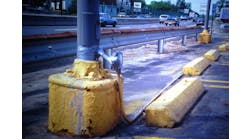Got a business-related question for Mister Sparky? Send it to [email protected]. Mister Sparky (AKA Patrick Kennedy) is the owner of Mister Sparky, Inc. in Atlanta and the president of Electricians' Success International in St. Louis.
I'm thinking about letting my electricians keep their vans for personal use. Should I be worried?
You should never give your vans to your electricians for their personal use.
However, you can allow your team to drive the vans home in the evening and then straight to the office or their first call in the morning. In fact, if you do this properly and monitor it effectively, it can be a great benefit to both the technician and the company.
For your electricians, it will mean not having to spend money on a second vehicle. If they have one car for their family, they can then use the van to drive back and forth to work. Also, it may allow your employees to get home sooner in the evenings if their last call is close to home. We'll often try to schedule calls in this manner, and our electricians really appreciate it.
For the company, it will mean getting your technicians to their first call quicker in the morning since oftentimes they'll be able to go there directly from home. This boosts productivity, but it also boosts employee morale because you're providing them with an additional perk. However, since it's a benefit, be sure to check with your local laws about any taxes your electricians may owe on the vehicles.
Bear in mind, though, that you'll need to monitor it properly. I allow my electricians to drive their vans home after their last call and back in the morning to the office or their first call, but that's it. Any use outside of that is strictly prohibited. And while I do trust my team, I monitor their van usage with a GPS system. I look at it as a way to keep the honest techs honest and to make sure the dishonest ones follow the rules.
I heard something about electronic dispatching where technicians don't even have to come into the office to get their assignment. Does it work?
It seems that everyone has a different method for dispatching their technicians to calls throughout the day. Some companies have their techs phone the office after each call, and some will send out the next job automatically via text message. Both can work depending on your situation.
While your technicians don't have to return to the office after each call, I would recommend having them phone in after each one. After all, every call is different, and you never know when their first call of the day could turn into their only call. Therefore, at Mister Sparky we rely on strong communications between the technicians and our dispatcher and then between our dispatcher and the clients.
However, we do have automatic dispatching should we choose to use it. Here's how it works. A technician receives his first job via text message on his two-way phone. When he arrives there, he simply clocks in via his phone, which updates the computer at the office. When he finishes, he clocks out. At that point, if we have another job scheduled for him, it's sent to his phone automatically.
It sounds simple, but I wouldn't recommend automatic dispatching to everyone in electrical service. In fact, we only rarely use it. It might work for a smaller company or on a light Saturday where you only have a few calls to finish. But in my company, we value strong verbal and electronic communications between everyone to make sure we match up technicians with calls that take advantage of their strengths and ensure that the client knows when we'll arrive.
With an automated system that only dispatches one job at a time, a technician won't know what else is scheduled for him that day. As a result, he may spend twice as long serving a client and wind up behind for the rest of the day. In that scenario, both the technician and the client get upset.
The best dispatching system will utilize the strengths of your technicians and put the emphasis on customer service, and for that, we still need strong human interaction.



